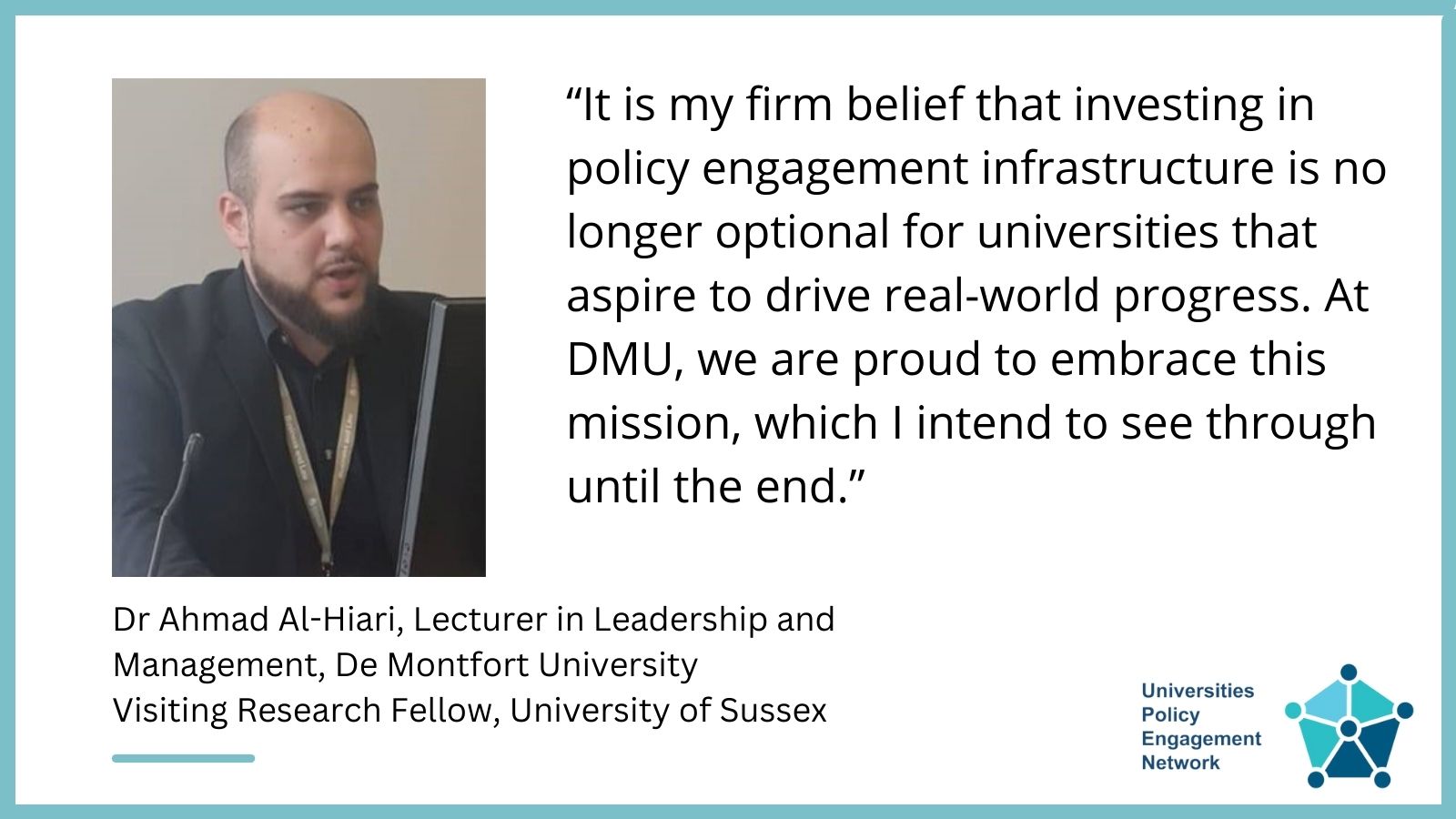Pioneering Policy Engagement at De Montfort University

I am delighted to share with you De Montfort University's (DMU) experience in launching its dedicated Policy Engagement Unit, and to highlight the invaluable support I received from the Universities Policy Engagement Network (UPEN) throughout my journey in building and leading this initiative.
De Montfort University is a dynamic and ambitious institution that is committed to delivering excellence in knowledge creation. Our strategic priorities have placed strong emphasis on fostering interdisciplinary research that generates meaningful societal impact. This commitment is illustrated by our status as the only UK university to be designated as a hub for the United Nations' Sustainable Development Goal 16 (SDG 16), which focuses on promoting peace, justice, and strong institutions. As part of this role, we have created a global network of 100 universities to facilitate the sharing of research, information, and best practices aimed at advancing SDG 16. These achievements, along with our performance in the latest Research Excellence Framework (REF), where over 60% of DMU's research was rated as world-leading or internationally excellent, underscores our commitment to generating impactful research. Building on this foundation, our next frontier was to develop means of empowering our expertise in informing and shaping policies.
My own passion for policy engagement was ignited during my doctoral research, where I explored the intricate dynamics of governance reforms through the narratives of senior government executives. This experience brought focus to the need for stronger engagement between research and the policymaking process. My journey in policy engagement gained momentum through my collaboration with the Policy Team at the University of Sussex. With their support, I organized a conference in Jordan on "Improving international anti-corruption measures by addressing informal practices in Middle-Eastern public administrations." This event, funded by Research England, brought together key stakeholders from both the Jordanian and British governments, including the British Ambassador to Jordan as well as high-ranking Jordanian officials such as the Minister of Public Works and the Deputy Speaker of the House of Representatives. This experience further fuelled my determination to establish a dedicated network at DMU to support researchers (like myself) in realizing their ambitions of fostering meaningful change through their research.
To validate DMU’s momentum for policy impact, I organized an inaugural Policy Engagement Symposium in February 2023, which hosted Leicester's esteemed Deputy Mayor, Adam Clarke, as our guest of honour. The summit provided a platform for a vibrant talk that explored collaborative opportunities between DMU's research and the city council's priorities for uplifting the lives of Leicester's citizens. The resounding success of this event not only validated the demand for more partnerships but also served as a valuable proof-of-concept for our Policy Unit.
Throughout this journey, the guidance and support provided by UPEN was invaluable. From the continuous guidance from UPEN's Co-Chair, Sarah Chaytor, on effective unit design, to the expert-led workshops delivered by UPEN's Vice-Chairs and Network Manager at our summit, UPEN has equipped us with the foundations needed to design our policy engagement strategy. Their engaging sessions charged our academics with both knowledge and enthusiasm to take their research forward to the policy arena. Moreover, our engagement with UPEN's growing International Sub-Committee has provided us with unique opportunities to contribute to international policy challenges.
Looking ahead, our immediate focus is on synthesizing the opportunities we have engaged with (both regionally and internationally) into concrete pilot projects. In the near future, we plan to launch an interactive portal that showcases DMU's policy-relevant scholarship and contributions to foster potential collaborations. Additionally, we are committed to hosting annual cross-sector conventions that celebrate impact research and its potential to drive policy change. This is coupled with plans for policy engagement training/courses, co-sponsored events to facilitate networking with decision-makers, and in-house workshops to explore potential collaborative research and knowledge exchange opportunities.
As we move forward, we are continually propelled by UPEN's ongoing support and the high enthusiasm of our research community. It is my firm belief that investing in policy engagement infrastructure is no longer optional for universities that aspire to drive real-world progress. At DMU, we are proud to embrace this mission, which I intend to see through until the end. To those considering embarking on similar initiatives, I wholeheartedly encourage you to do so, and to leverage the guidance that UPEN offers. Such efforts should be always guided by your institution's unique strengths and research community’s underlying interests. While the road ahead may be long, this journey is well worth pursuing.










































































































